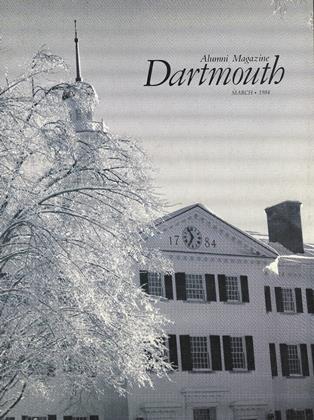You may have noticed the little flap that Yale President Bart Giamatti caused some weeks back when he commented about the Elis' disastrous football season and somewhat uncharacteristically took a swipe at perennially top-ranked Nebraska. "There is in the world," he said, "some wholly fallacious belief that there's a correlation between big-time football and big-time excellence. If that were true, then the University of Nebraska would be the greatest university in America." Down the road a bit in Princeton, a disenchanted alumus wrote his alumni magazine that recent Tiger elevens had been "enough of an embarrassment" for him. And here in Hanover overlooking the northwest corner of the Green, I just received a note from a fellow of my vintage who commented, "Rather than wasting space in the last issue of the Magazine on how pleasant it was [for the men's basketball team] to be destroyed by the University of North Carolina, why not devote some space to what the Admissions Office and the DCAC are going to do to at least give us parity in the Ivy League? "
As if this weren't enough, the Dartmouth men's hockey team which made it all the way to the semi-finals of the NCAA's twice over the past five years finished at 3-23, the worst hockey season in the College's history. The fact is, the team wasn't nearly as bad as its record suggests. I was in Thompson Arena to see them play two periods of inspired hockey well, one inspired period and one that was respectable against nationally-ranked RPI. Unfortunately, there are three periods in hockey and before it was over, the Green machine was moving at about the pace, but not with the efficiency, of the Zamboni.
What the Winter Olympics should have taught us was not that being No. 1 is the greatest, but that being there competing is really what athletic endeavor is (or should be) all about. In many respects, this concept, which is at the heart of the Ivy philosophy, is a simple restatement of the classical ideal of a sound mind in a sound body. Of course, everyone would rather win than lose/but being there, in a rugby scrum, as sweeper on the field hockey team, even as No. 6 man on the depth chart, is important. This point was hammered home during the opening of the American hockey team's highly-touted defense of its 1980 Gold Medal when the lowly Canadian team, led by Dartmouth's own Carey Wilson '83, crushed America's medal hopes. All Wilson did was score a hat trick and assist on another goal. But because he is a Canadian (and wasn't on the American team like Harvard's Mark Fusco or Yale's Bobbie Brooke), he was hardly mentioned by the obviously shell-shocked (and biased) ABC announcers. Skier Tiger Shaw '84, who is an American, fell twice at Sarajevo and thus got hardly any press. (The following week, incidentally, he returned stateside to take second in the national Alpine Championships.) Sure, it was thrilling to see the Mahres win, but I'll lay you 3-1 odds that for Tiger and Carey and jumper Landis Arnold and all of the other Dartmouth competitors at Sarajevo, just being there was the thrill of a lifetime.
The Ivies can't compete on the gridiron with the likes of Nebraska or at the Cap Center with Georgetown and Patrick Ewing, but there is more to life than football, skiing, basketball, or hockey. By insisting on rigid academic standards and by keeping athletics in perspective (viz., for the primary enjoyment of students, not rabid spectators), the Ivies seem to have grasped that point very well.
 View Full Issue
View Full Issue
More From This Issue
-
 Feature
FeatureBraving the Alps
March 1984 By Jack Aley '66 -
 Feature
FeatureShaping Public Policy: The Washington Internship Program
March 1984 By Frank Smallwood '51 -
 Cover Story
Cover StoryA New in the Neighborhood
March 1984 By Debbie Schupack '84 -
 Feature
FeatureThose Championship Seasons
March 1984 By Brad Hills '65 -
 Article
ArticleThe Price of Art
March 1984 By Monica Louise Latini '84 -
 Class Notes
Class Notes1963
March 1984 By Harry R. Zlokower
Douglas Greenwood
-
 Lettter from the Editor
Lettter from the EditorSettling in in Hanover
JUNE 1983 By Douglas Greenwood -
 Lettter from the Editor
Lettter from the EditorVisions and Revisions
SEPTEMBER 1983 By Douglas Greenwood -
 Lettter from the Editor
Lettter from the Editor75 and Counting
OCTOBER, 1908 By Douglas Greenwood -
 Lettter from the Editor
Lettter from the EditorThe Real World
JUNE/JULY 1984 By Douglas Greenwood -
 Lettter from the Editor
Lettter from the EditorDouble Vision
MARCH • 1985 By Douglas Greenwood -
 Lettter from the Editor
Lettter from the EditorTo an old friend
NOVEMBER • 1985 By Douglas Greenwood
Lettter from the Editor
-
 Lettter from the Editor
Lettter from the EditorEditorial Comment
APRIL 1930 -
 Lettter from the Editor
Lettter from the EditorEditorial Comment
April 1931 -
 Lettter from the Editor
Lettter from the EditorLetter from Oxford
April 1949 By CHARLES G. BOLTE '41 -
 Lettter from the Editor
Lettter from the EditorWinter and Rough Weather
DECEMBER 1983 By Doug Greenwood -
 Lettter from the Editor
Lettter from the EditorA Family Affair
JANUARY/FEBRUARY 1986 By Douglas Greenwood -
 Lettter from the Editor
Lettter from the Editor'Round the Girdled Earth
April 1945 By H. F. W.

